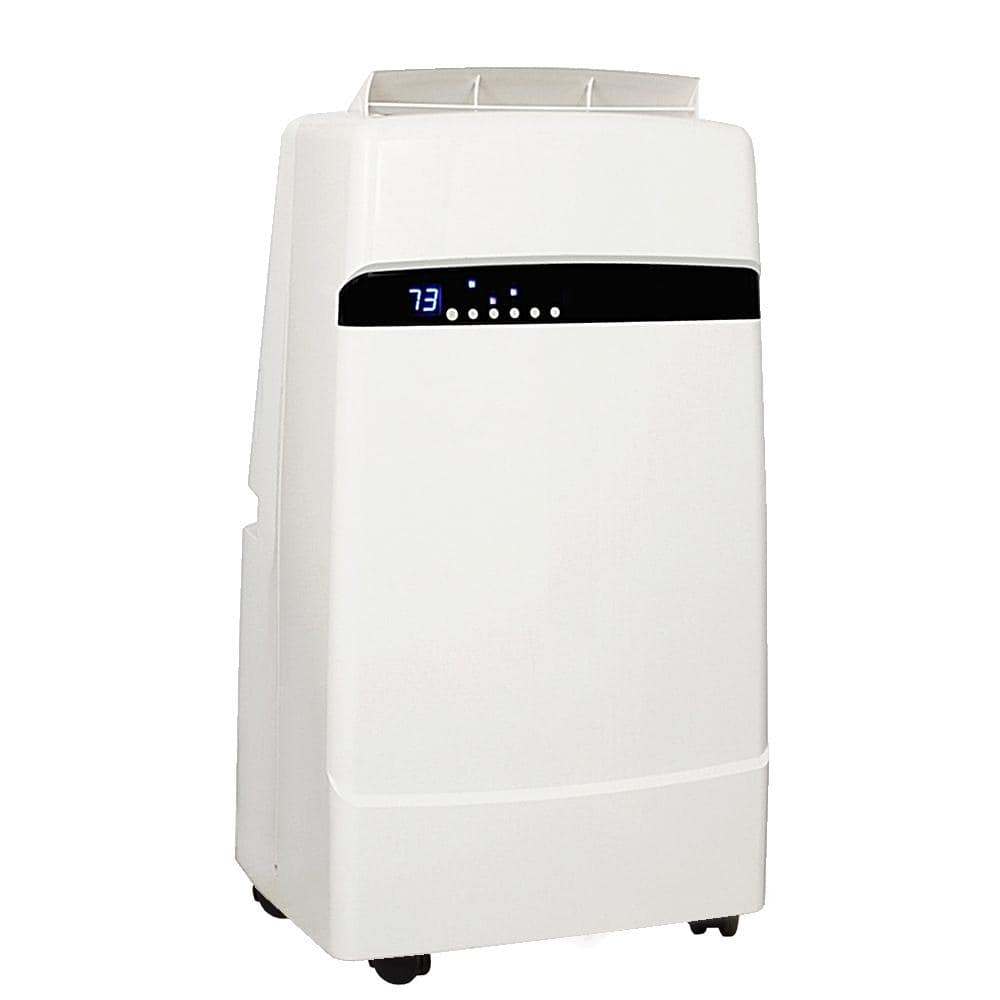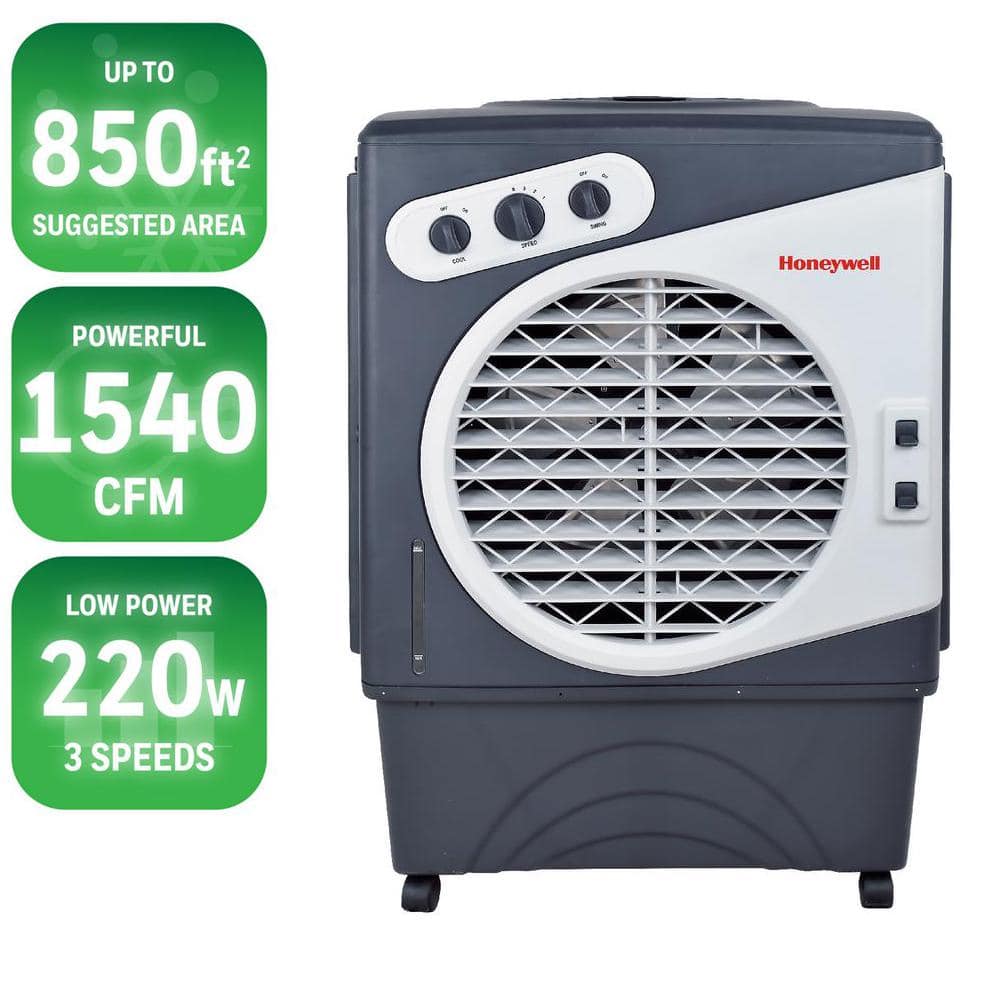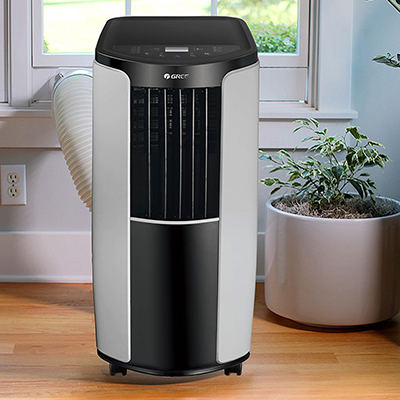Types of Air Conditioners

Published April 30, 2025
The right air conditioner can keep your home cool and comfortable all season long. Although it's the most popular, a central air conditioner is only one of the three types of air conditioners. There are many kinds of air conditioners, including air conditioners that double as a heater and quiet window air conditioners. Read on to learn about the most efficient air conditioners, benefits of different air conditioners and more.
Table of Contents
Choosing the Best Air Conditioner for Your Home
Central Air Conditoners
Window Air Conditioners
Portable Air Conditioners
Built-In Wall Air Conditioners
Ductless Mini-Split Air Conditioners
Choosing the Best Air Conditioner for Your Home

There are several different air conditioner sizes and cooling capacities. Here are several things to think about before selecting the best air conditioner for your space:
- Determine the square footage of your home to get the right size air conditioner. If the unit is too small or too large it won’t cool your space efficiently.
- If you live in a hot and humid area, you may want to invest in a larger unit with a higher cooling capacity. Or if your climate is mild, a smaller air conditioner should work fine.
- Air conditioners can range in price from a few hundred dollars to several thousand dollars.
- Budget wisely. A higher quality air conditioner may require more of an upfront investment, but its durability may save you in the long run.
- Air conditioners can consume a lot of energy. It's important to choose an energy-efficient model.
- Decide what features mean the most to you, such as programmable thermostats or air purifiers.
- Most air conditioners require professional installation so make sure you factor that expense into your total budget.
Central Air Conditoners

Central air conditioners are the most popular way to cool an entire house.
- Ideal for larger homes
- Higher energy-efficiency ratings and lower energy bills
- Requires a higher upfront investment
- Professional installation
- Runs quiet
Window Air Conditioners

Budget-friendly and easy to install, window air conditioner units cool one room at a time.
- Can be installed in either a single- or double-hung window
- Comes with accordion panels for secure fit
- Great for cooling single rooms or small spaces
- Budget and space-friendly option
- Easy to install
Portable Air Conditioners

One of the main benefits of a portable air conditioner is that it can easily be moved from one room to another as needed.
- Can be used in windowless areas
- Saves energy costs by only cooling rooms that are in use
- Comes with multiple fan speeds and settings
- Exhaust system or reservoir to handle moisture
- Can be heavy
Built-In Wall Air Conditioners

Installed directly into the wall, these types of air conditioners are often found in apartments, garages and older homes.
- Wall installation keeps cool air in and hot air out
- Uses less energy compared to other types of air conditioners
- Some models provide both cold and hot air
- Good alternative to a central heating and air system
- Can require a higher upfront investment
- May need professional installation
Ductless Mini-Split Air Conditioners

A ductless mini-split air conditioner works without you having to install ducts.
- Sleek, compact design
- Unit can be used anywhere
- Uses less energy than a traditional wall unit
- Multi-stage air filtration, improved home air quality
- Can be controlled from a smart device
Floor Mounted Air Conditioners

Typically installed on the ground level of your home, floor mounted air conditioners are good for multi-level or large open spaces.
- Can be installed through walls or windows
- Some models have high energy efficiency ratings
- Can be noisy
- Comes in various sizes and cooling capacities
- Able to cool larger areas cost effectively
- Popular choice for homes with high ceilings
Wall Mounted Air Conditioners

Compact and versatile, wall air conditioners units can cool or heat a room without using a lot of floor space.
- Mounted flush with the interior wall surface
- Compact, modern appearance
- Ideal for smaller rooms or spaces with limited floor space
- Easily installed by a professional or experienced DIYer
- Good for cooling specific rooms or areas as needed.
- More budget-friendly than central units
Smart Air Conditioners

Smart air conditioners are designed to automatically monitor and adjust cooling based on your home's temperature and humidity levels.
- Can detect when someone is in the room and adjust cooling
- More energy efficient way to maintain comfort
- Can significantly lower energy bills
- Control your AC unit from your smartphone
- Set schedules or use geofencing to turn the air conditioner off automatically
Hybrid/Dual Fuel Air Conditioner

This type of smart air conditioner combines an electric air conditioner with a gas furnace. A hybrid or dual fuel unit can switch between two energy sources for cost savings.
- Perfect for year-round use
- Uses both electricity and gas
- Provides energy savings
- Efficiently handles extreme weather conditions
- Smart thermostats and other remote features
Evaporative Coolers

Also known as a swamp cooler, an evaporative cooler works by pulling in hot air and passing it through wet cooling pads.
- Uses water and a small amount of electricity
- Adds moisture to the air, good for dry climates
- Can be used indoors and out
- Environmentally friendly
- Budget friendly
- Low maintenance
Rooftop Air Conditioners

A rooftop air conditioner provides cooling for entire home. Unlike other air conditioners they free up space in indoor and outdoor areas.
- Great for apartments or small houses
- Can’t be easily seen
- Runs quietly
- More energy efficient than window units
- Often come with programmable thermostats
Variable Speed Air Conditioners

Compared to other options, variable speed air conditioners automatically adjust speed to meet demand. They operate at lower speeds when cooling demand is low.
- Provides better energy efficiency
- Maintains a more consistent comfort level
- Better humidity control
- Higher upfront investment
- Runs quiet, ideal for bedrooms
- Reduces the risk of mold and mildew growth
Air Conditioner Sizes

Air conditioners range from 1 to 5 ton sizes. These sizes determine the amount of BTUs the unit has. To determine the type and size of air conditioner, you'll need to:
- Calculate your room size: Multiply the room length by the room width in feet to get the square footage of the area to be cooled.
- Check your connections: Check out your power source (nearby outlet) and make sure to match the unit to that outlet.
- Measure to fit: Measure the height and width of the opening and check the dimensions of the AC unit you select to be sure it will fit.
Below are the standard dimensions of popular air conditioners:
- Window-mounted air conditioning units: 24 x 16 x 12 inches
- Portable air conditioners: 29 x 24 x 14 inches
- Wall air conditioning units: 40 x 20 x 22 inches
- Central air conditioning units: 40 x 30 x 12 inches
Energy Efficient Air Conditioners

Running an air conditioning system is one of the largest energy uses in a home. Choosing an energy efficient air conditioning system can lower your utility bill. All types of air conditioners are labeled with their EER (Energy Efficiency Rating). EERs range from 8 to 11.5. Units with higher ratings offer lower greenhouse emissions and bills. Consider getting an air conditioner ENERGY STAR certification and check the yellow label for more information.
Cooling Capacity & BTUs

The capacity and efficiency of an air conditioning or heating unit is measured in BTUs. The higher its BTU rating, the quicker the unit can cool a room. BTU ratings generally range from 5,000 BTUs to more than 20,000. In general, 20 BTUs are needed per square foot of living space.
When choosing the correct BTU rating for your home, factor in things like ceiling height, room insulation, sun exposure and your area’s climate. For example:
- For rooms with excessive sunlight, use an additional 10 percent more BTUs
- For units installed in kitchens, use an additional 4,000 BTUs
- For general rooms, add 600 BTUs per person
The best air conditioner for your home makes all the difference in keeping it comfortable. Although central air conditioning units are the most popular, there are also window units, split systems, portable air conditioners and more. Selecting the right one means thinking about your budget, the cooling capacity you need and installation requirements. Ready to get your new air conditioner? Use The Home Depot Mobile App to locate products and check inventory. We'll take you to the exact aisle and bay.
HVAC repair and replacement services are best handled by licensed and trained professional. Our Home Services team can help make the process smooth and keep your home feeling comfortable all year long. Get a free quote on our HVAC installation services, or schedule a consultation today for more information. We also offer HVAC maintenance services.




































